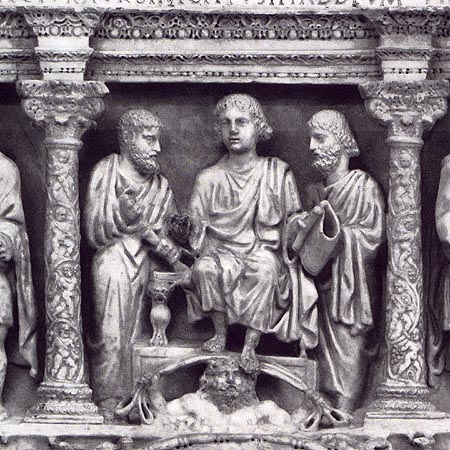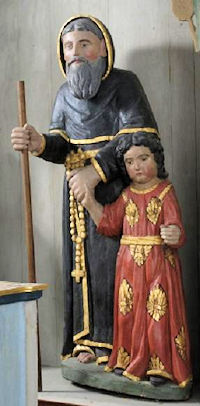33. Again you have heard that it has been said by them of old time, You shall not forswear yourself, but shall perform to the Lord your oaths;
34. But I say to you, Swear not at all, neither by Heaven, for it is God's throne;
35. Nor by the earth, for it is His footstool; neither by Jerusalem, for it is the city of the great King.
36. Neither shall you swear by your head, because you cannot make one hair white or black.
37. But let your communication be, Yea, yea; Nay, nay; for whatsoever is more than these comes of evil.
GLOSS.The Lord has taught to abstain from injuring our neighbor, forbidding anger with murder, lust with adultery, and the putting away a wife with a bill of divorce. He now proceeds to teach to abstain from injury to God, forbidding not only perjury as an evil in itself but even all oaths as the cause of evil, saying, You have heard it said by them of old, You shall not forswear yourself it is written in Leviticus, You shall not forswear yourself in My name (Lev 19:12); and that they should not make gods of the creature, they are commanded to render to God their oaths, and not to swear by any creature, Render to the Lord your oaths; that is, if you shall have occasion to swear, you shall swear by the Creator and not by the creature. As it is written in Deuteronomy, You shall fear the Lord your God, and shall swear by His name (Deut 6:13).
JEROME; This was allowed under the Law, as to children; as they offered sacrifice to God, that they might not do it to idols, so they were permitted to swear by God; not that the thing was right, but that it were better done to God than to demons.
PSEUDO-CHRYS. For no man can swear often, but he must sometimes forswear himself; as he who has a custom of much speaking will sometimes speak foolishly.
AUG. Inasmuch as the sin of perjury is a grievous sin, he must be further removed from it who uses no oath, than he who is ready to swear on every occasion, and the Lord would rather that we should not swear and keep close to the truth, than that swearing we should come near to perjury.
ID. This precept also confirms the righteousness of the Pharisees, not to forswear; inasmuch as he who swears not at all cannot forswear himself. But as to call God to witness is to swear, does not the Apostle break this commandment when he says several times to the Galatians, The things which I write to you, behold, before God, I lie not (Gal 1:20). So the Romans, God is my witness, whom I serve in my spirit (Rom 1:9). Unless perhaps someone may say, it is no oath unless I use the form of swearing by some object; and that the Apostle did not swear in saying, God is my witness. It is ridiculous to make such a distinction; yet the Apostle has used even this form, I die daily, by your boasting. That this does not mean, 'your boasting has caused my dying daily,' but is an oath, is clear from the Greek.
ID. But what we could not understand by mere words, from the conduct of the saints we may gather in what sense should be understood what might easily be drawn the contrary way, unless explained by example. The Apostle has used oaths in his Epistles, and by this shows us how that ought to be taken, I say to you, Swear not at all, namely, lest by allowing ourselves to swear at all we come to readiness in swearing, from readiness we come to a habit of swearing, and from a habit of swearing we fall into perjury. And so the Apostle is not found to have used an oath but only in writing, the greater thought and caution which that requires not allowing of slip of the tongue. Yet it is the Lord's command so universal, Swear not at all, that He would seem to have forbidden it even in writing. But since it would be an impiety to accuse Paul of having violated this precept, especially in his Epistles, we must understand the words at all as implying that, as far as lays in your power, you should not make a practice of swearing, not aim at it as a good thing in which you should take delight.
ID.Therefore in his writings, as writing allows of greater circumspection, the Apostle is found to have used an oath in several places, that none might suppose that there is any direct sin in swearing what is true; but only that our weak hearts are better preserved from perjury by abstaining from all swearing whatever.
JEROME; Lastly, consider that the Savior does not here forbid to swear by God, but by the Heaven, the Earth, by Jerusalem, by a man's head. For this evil practice of swearing by the elements the Jews had always, and are thereof often accused in the prophetic writings. For he who swears, shows either reverence or love for that by which he swears. Thus when the Jews swore by the Angels, by the city of Jerusalem, by the temple and the elements, they paid to the creature the honor and worship belonging to God; for it is commanded in the Law that we should not swear but by the Lord our God.
AUG. Or, it is added, By the Heaven, &c. because the Jews did not consider themselves bound when they swore by such things. As if He had said, When you swear by the Heaven and the Earth, think not that you do not owe your oath to the Lord your God, for you are proved to have sworn by Him whose throne the heaven is, and the earth His footstool; which is not meant as though God had such limbs set upon the heaven and the earth, after the manner of a man who is sitting; but that seat signifies God's judgment of us. And since in the whole extent of this universe it is the heaven that has the highest beauty, God is said to sit upon the heavens as showing divine power to be more excellent than the most surpassing show of beauty; and He is said to stand upon the earth, as putting to lowest use a lesser beauty. Spiritually by the heavens are denoted holy souls, by the earth the sinful, seeing He that is spiritual judges all things (1 Cor 2:15). But to the sinner it is said, Earth you are, and to earth you shall return (Gen 3:19). And he who would abide under a law, is put under a law, and therefore He adds, it is the footstool of His feet. Neither by Jerusalem, for it is the city of the Great King; this is better said than 'it is mine,' though it is understood to mean the same. And because He is also truly Lord, whoso swears by Jerusalem, owes his oath to the Lord. Neither by your head. What could any think more entirely his own property than his own head? But how is it ours when we have not power to make one hair black or white? Whose then swears by his own head also owes his vows to the Lord; and by this the rest may be understood.
CHRYS. Note how he exalts the elements of the world, not from their own nature, but from the respect which they have to God, so that there is opened no occasion of idolatry.
RABANUS;Having forbidden swearing, He instructs us how we ought to speak, Let your speech be yea, yea; nay, nay. That is, to affirm anything it is sufficient to say, 'It is so'; to deny, to say, 'It is not so.' Or, yea, yea; nay, nay, are therefore twice repeated, that what you affirm with the mouth you should prove in deed, and what you deny in word you should not establish by your conduct.
HILARY; Otherwise, they who live in the simplicity of the faith have not need to swear, with them ever, what is is, what is not is not; by this their life and their conversation are ever preserved in truth.
JEROME; Therefore Evangelic verity does not admit an oath, since the whole discourse of the faithful is instead of an oath.
AUG. And he who has learned that an oath is to be reckoned not among things good, but among things necessary, will restrain himself as much as he may, not to use an oath without necessity, unless he sees men loathe to believe what it is for their good they should believe, without the confirmation of an oath. This then is good and to be desired, that our conversation be only, yea, yea; nay, nay; for what is more than this comes of evil; that is, if you are compelled to swear, you know that it is by the necessity of their weakness to whom you would persuade anything; which weakness is surely an evil. What is more than this is thus evil; not that your do evil in this just use of an oath to persuade another to something beneficial for him; but it is an evil in him whose weakness thus obliges you to use an oath.
CHRYS. Or, of evil, that is, from their weakness to whom the Law permitted the use of an oath. Not that by this the old Law is signified to be from the Devil, but He leads us from the old imperfection to the new abundance.
Catena Aurea Matthew 5
The Word Among Us
Meditation: 2 Corinthians 5:14-21
Common of the Blessed Virgin Mary
The love of Christ impels us. (2 Corinthians 5:14)
Born in 1883, Blessed Hildegard Burjan was a laywoman and mother who worked tirelessly to overcome social injustice in her homeland of Austria. A Jewish woman who converted to Christianity, she spent much of her life fighting for fair labor laws and protection for women and children. Despite serious health concerns, she served in local politics on behalf of the poor and eventually started a religious community. The driving force of her life’s work was the compelling love of Christ, which became the motto of her sisterhood. Hildegard proves that this love—which Paul writes about so passionately—can move people of all classes, races, and ages to step out in faith and serve their neighbors.
What is so compelling about Christ’s love? If we look at the Gospels, we can see that Jesus loved in a countercultural way. He honored outcasts and sinners. He served those he led. He died for those who hated him as well as those who loved him. Every word he spoke and every action he took was motivated by love.
Throughout history, Christ’s love has touched countless people and moved them to love as Jesus loves. For some, like Hildegard, this meant dedicating their lives to serving the poor. For others, it has meant taking up new ministries in their parishes. But for the vast majority, it has meant simply loving their neighbors in a selfless way by putting their neighbors’ needs ahead of their own.
Take time today to reflect on the love of Jesus for every person you see around you. Say to yourself, “Jesus, you love them.” Then, pray to see one way that you can show his love. It may be large or small. Maybe you can help in a soup kitchen or visit a nursing home. Or perhaps you will be moved to show more affection at home or to practice greater patience at work. Who knows? Maybe God will put something even bigger on your heart, as he did for Hildegard Burjan.
Whatever it is, let the love of Jesus fill your heart. Ask him to urge you forward, to remind you when you forget, and to give you his grace to help you love people who urgently need it.
“Jesus, let your love compel me to action.”
Psalm 103:1-4, 9-12
Matthew 5:33-37
 Image: Statue de San Giuseppe Cafasso | José Luiz Bernardes Ribeiro
Image: Statue de San Giuseppe Cafasso | José Luiz Bernardes Ribeiro 

 St. Gregory was born on September 16, 1625, and he died in 1697. His family lived in Venice and were held in high repute by the people there. He was the fourth son. He excelled in his studies at an early age and became interested in diplomacy and statesmanship. He knew Contarine, the Venetian ambassador, and went with him on at least one ambassadorial mission.
St. Gregory was born on September 16, 1625, and he died in 1697. His family lived in Venice and were held in high repute by the people there. He was the fourth son. He excelled in his studies at an early age and became interested in diplomacy and statesmanship. He knew Contarine, the Venetian ambassador, and went with him on at least one ambassadorial mission. Saint Hervé is venerated throughout Brittany but we have few reliable particulars on him–his life was not written until the late medieval period. All we really know is that he was a hermit in Brittany, where he is still highly venerated and where Hervé is one of the most popular names for boys.
Saint Hervé is venerated throughout Brittany but we have few reliable particulars on him–his life was not written until the late medieval period. All we really know is that he was a hermit in Brittany, where he is still highly venerated and where Hervé is one of the most popular names for boys.